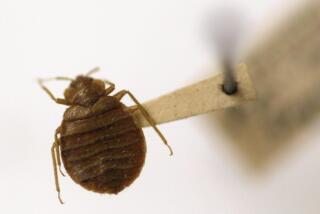In Russia, April Fools’ Day Hoaxes Compete With the Actual News : Media: Citizens learn about snakes in Moscow sewers and a potion that covered Gorbachev’s birthmark. One of those reports is for real.
- Share via
MOSCOW — Karate specialists are hired to collect bus fares from recalcitrant passengers. Poisonous snakes multiply in the Moscow sewers, terrifying residents. The Russian Communist Party abandons some sacred tenets of Marxism and Leninism.
Friday was April Fools’ Day, and the Russian news media was full of tales that imaginative journalists had waited a whole year to make up.
The catch: Some of Friday’s headline-grabbing stories--including the three above--were for real. In a society that is so rapidly falling apart and reinventing itself, truth is often weirder than fiction.
With journalistic hoaxes mixed in indiscriminately among news dispatches describing real and surreal events, Russian newspaper readers and television viewers could be forgiven for believing that:
* Mikhail S. Gorbachev tested an anti-baldness potion during a recent trip to South Korea and sprouted curly hair over his famous birthmark. (The newspaper Moskovsky Komsomolets sure made it look that way in a photograph of the former Soviet president.)
* Russia’s alcohol industry has invented a chewy “vodka bar”--flavored with lemon, coconut or salted cucumber--to compete with Mars and Snickers bars.
* Owing to a lack of cash, a meatpacking plant is paying its employees’ salaries in sausage; its retired workers are collecting their pensions in the form of bones.
* The pro-Communist Agrarian Party is trying to train insects to attack Russia’s new private farms and leave the collectives alone.
And then there was reality:
* The government news agency Itar-Tass reported the day’s currency exchange rates, then followed up with news of a new “special convertible bank note” with a value of 5,000 Russian rubles on one side and five German marks on the other.
* One report--not made up--said the Communists had renounced “all revolutionary leaps and forcible methods” for achieving socialism.
“There are two problems with Russia--roads and fools,” wrote Nikolai Gogol, the great Russian satirist, who was born on April Fools’ Day, 1809. Under Communist rule, Russians talking among themselves raised satire to a new art, seizing on April 1 to “breathe the fresh air of humor,” in the words of Benedict M. Sarnov, a modern literary critic.
*
But it is only since the Soviet Union collapsed in 1991 that Russians have joked on this scale in print. Even television, the medium under tightest control by the Kremlin, joined in Friday’s orgy of pranks. Few public figures, in government or the opposition, escaped ridicule.
* Rossiskaya Gazeta reported that Freemasons had kidnaped Vladimir V. Zhirinovsky, Russia’s most famous fascist, and cut off his tongue.
* Komsomolskaya Pravda published an “interview” with the parrot of former Vice President Alexander V. Rutskoi, who was arrested for armed rebellion last fall but is now out of prison and back in politics.
“Let them make soup out of me, but I won’t let my master run for president,” the bird, identified as “Gosha,” was quoted as squawking. “It is better to sit in a cage than in the Kremlin.”
Some humor was more subtle. The evening news program “Vesti,” mimicking the tone of Soviet boasts about production quotas, reported that Russia’s still-prevalent collective farms had passed technical muster and were “97% ready” for spring planting. The screen showed tractors rusting in the snow.
Most of the jokes played off Russians’ bewilderment with life after communism. One fictitious report had chemical arms producers converting their industry to produce spray-on tights. Another claimed that capitalists were bringing double-decker trolley buses to Moscow, to be followed by triple-deckers if all goes well.
After so much ethnic warfare spawned by the Soviet breakup--in places such as Georgia, Azerbaijan and Tajikistan--the Moscow Tribune asked people on the street what they thought of ethnic cleansing in Brutistan. It published their replies Friday, along with their photographs.
Brutistan doesn’t exist.
More to Read
Sign up for Essential California
The most important California stories and recommendations in your inbox every morning.
You may occasionally receive promotional content from the Los Angeles Times.











